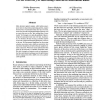Free Online Productivity Tools
i2Speak
i2Symbol
i2OCR
iTex2Img
iWeb2Print
iWeb2Shot
i2Type
iPdf2Split
iPdf2Merge
i2Bopomofo
i2Arabic
i2Style
i2Image
i2PDF
iLatex2Rtf
Sci2ools
101
click to vote
VLDB
1998
ACM
1998
ACM
On the Discovery of Interesting Patterns in Association Rules
Many decision support systems, which utilize association rules for discovering interesting patterns, require the discovery of association rules that vary over time. Such rules describe complicated temporal patterns such as events that occur on the "first working day of every month." In this paper, we study the problem of discovering how association rules vary over time. In particular, we introduce the idea of using a calendar algebra to describe complicated temporal phenomena of interest to the user. We then present algorithms for discovering culendric association rules, which are association rules that follow the patterns set forth in the user supplied calendar expressions. We devise various optimizations that speed up the discovery of calendric association rules. We show, through an extensive series of experiments, that these optimization techniques provide performance benefits ranging from 5% to 250% over a less sophisticated algorithm.
Related Content
| Added | 06 Aug 2010 |
| Updated | 06 Aug 2010 |
| Type | Conference |
| Year | 1998 |
| Where | VLDB |
| Authors | Sridhar Ramaswamy, Sameer Mahajan, Abraham Silberschatz |
Comments (0)

